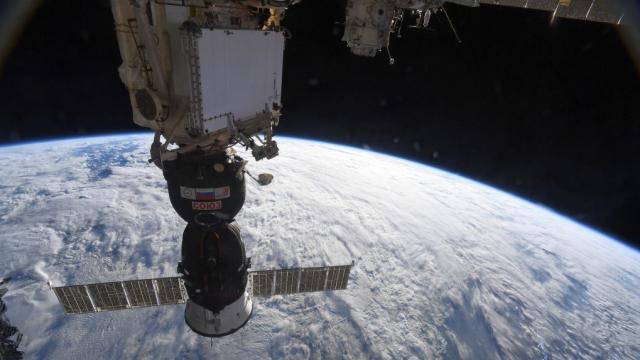Last week’s air pressure leak aboard the International Space Station was not caused by a micrometeorite, Russian space agency Roscosmos is now claiming, but rather the result of human error, or possibly even a deliberate act of sabotage. Either way, the incident points to poor oversight and lack of quality control measures at the Russian space agency.
On August 30, a 2mm “microcrack” was detected on the hull of a Soyuz MS-09 spacecraft, which is currently docked to the ISS. The six astronauts aboard the ISS were never in any peril, as the air pressure leak was very small and easily contained.
A strip of Kapton tape was placed over the hole as a stopgap measure, followed by the application of an epoxy-based sealant. The ISS is no longer leaking air into space, and the hole appears to be stable.
ISS leak update: the patch is reported to be holding but further work will be done. The best guess seems to be that the hole is NOT a debris strike but a drill hole created during manufacture and whatever was plugging it for the past 2 months popped out a couple days ago.
— Jonathan McDowell (@planet4589) September 1, 2018
Initially, a micrometeorite was blamed for the leak — a theory that the Russian space agency has now ruled out. In a televised press conference held yesterday, Dmitry Rogozin, CEO of Roscosmos, said the leak was caused by a “technological error”.
Apparently, the leak was coming through a drill hole that was accidentally produced during the manufacturing process, and the material used to the plug the hole suddenly dislodged. But it isn’t clear if the hole was produced on the ground or in space, or if the hole was the result of accidental or deliberate action.
“We are considering all the theories,” Rogozin said during the press conference.
“The one about a meteorite impact has been rejected because the spaceship’s hull was evidently impacted from inside. However it is too early to say definitely what happened. But, it seems to be done by a faltering hand… it is a technological error by a specialist. It was done by a human hand — there are traces of a drill sliding along the surface. We don’t reject any theories.”
Rogozin said it’s now a “matter of honour” for Energia Rocket and Space Corporation, the manufacturer of the Soyuz MS-09 module, to “find the one responsible” for the hole, to determine if it was an accident or “deliberate spoilage”, and to determine if the hole was created on Earth or in space.
“Now it is essential to [determine] the reason, to learn the name of the one responsible for that,” declared Rogozin, “And we will find out, without fail.”
An industry source told RIA Novosti, Russia’s international news agency, that an Energia employee likely made the hole in the internal hull of the module before sealing the crack with a special glue. That’s why the hole wasn’t detected during pressurisation tests prior to the spacecraft’s integration with the ISS.
The craft was deemed fit for action and launched to the ISS on June 6 with three astronauts on board. Once in orbit, however, “the glue dried and was squeezed out, opening the hole,” a source told RIA Novosti.
In addition to conducting an internal investigation, Energia will be checking all its Soyuz and Progress cargo craft for possible defects.
Photos taken of the drill hole show scratches and possible failed attempts at drilling, pointing to the “faltering hand” suggested by Rogozin.
That a single individual may be responsible for the hole seems likely, but it would be too convenient to place the blame squarely on one person. Roscosmos would very much like to deflect the blame onto Energia or the rocket company’s yet-to-be named employee, but the space agency shares the blame for failing to catch or prevent the defect.
Both Roscosmos and Energia will need to re-evaluate their internal processes to make sure something like this doesn’t happen again.
“The Russians are quicker than we are, historically, to yell ‘sabotage’. But it seems extremely unlikely,” astrophysicist Jonathan McDowell from the Harvard-Smithsonian Center for Astrophysics told Gizmodo.
For one thing, a saboteur might have made a bigger hole; at the maximum rate of leakage, the crew aboard the ISS had “weeks of air left” in reserve, according to a European Space Agency blog.
As for the theory that the hole was drilled in space, that’s a possibility, but it seems odd that an ISS astronaut wouldn’t fess up to making such an important mistake when it happened. And if it was a deliberate act, again, drilling a 2mm hole seems a fairly pathetic attempt at sabotage.
Consequently, let’s hope that this (mercifully) minor incident serves as a teachable moment for all parties involved.
